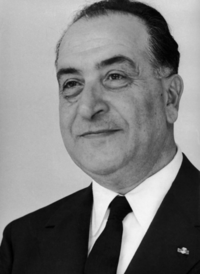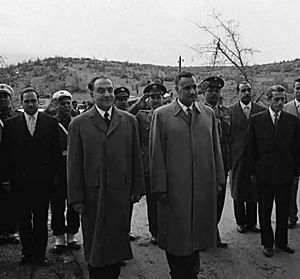Fouad Chehab facts for kids
Quick facts for kids
Fouad Chehab
|
|
|---|---|

Chehab in 1961
|
|
| 3rd President of Lebanon | |
| In office 23 September 1958 – 22 September 1964 |
|
| Prime Minister | Khalil al-Hibri, Rashid Karami, Ahmad Daouk, Saeb Salam, Hussein Al Oweini |
| Preceded by | Camille Chamoun |
| Succeeded by | Charles Helou |
| In office 18 September 1952 – 22 September 1952 Acting |
|
| Prime Minister | Himself (Acting) |
| Preceded by | Bechara El Khoury |
| Succeeded by | Camille Chamoun |
| 9th Prime Minister of Lebanon | |
| In office 18 September 1952 – 1 October 1952 |
|
| President | Himself (Acting), Camille Chamoun |
| Preceded by | Saeb Salam |
| Succeeded by | Khaled Chehab |
| Personal details | |
| Born | 19 March 1902 Ghazir, Keserwan District, Ottoman Empire |
| Died | 25 April 1973 (aged 71) Jounieh, Lebanon |
| Nationality | Lebanese |
| Political party | Independent |
| Spouse | Rose René Poitieux (m. 1926) |
| Profession | Military officer, politician |
| Awards | OM, ONC |
| Military service | |
| Allegiance | Lebanon |
| Branch/service | Lebanese Armed Forces |
| Years of service | active: 1945–1958 |
| Rank | Major General |
| Battles/wars | 1958 Lebanon crisis |
Fouad Abdullah Chehab (Arabic: فُؤادْ عبد الله شِهاب; born March 19, 1902 – died April 25, 1973) was a Lebanese politician and army general. He served as the third President of Lebanon from 1958 to 1964.
Chehab was born in Ghazir into a noble family. He joined the French Army in 1919. After Lebanon became independent from France, he helped create the Lebanese Armed Forces. He became the first Commander of the Lebanese Army in 1946.
In 1952, he was briefly appointed Prime Minister of Lebanon and acting president. This happened when the previous president, Bechara El Khoury, resigned because people were unhappy with his government. Chehab's job was to organize the next presidential election.
During the 1958 Lebanon crisis, a time of big disagreements in the country, Chehab was still the army commander. He made sure the army did not take sides with either the government or the opposition. This decision helped keep the army united and prevented more fighting. Because he was seen as fair, he was chosen as president in the 1958 Lebanese presidential election. Everyone, both in Lebanon and internationally, agreed he was the best choice to bring peace.
As president, Chehab brought in important changes and big projects to help the country grow. He built up the government's systems and brought back peace and success to Lebanon. His ideas and ways of governing continued even after his presidency, in what is known as Chehabism.
Early Life and Family
Fouad Chehab was born in 1902. He was the oldest son of Abdullah Chehab and Badiaa Hbeich. He had two younger brothers, Farid and Chakib. His family, the Chehab family, was very important. They had ruled Mount Lebanon for a long time during the Ottoman Empire. Fouad's great-grandfather was the brother of Bashir Shihab II, who ruled Lebanon for 40 years.
Military Career
Chehab became the commander of the Lebanese Armed Forces in 1945. This was when Lebanon gained its independence from French rule.
In 1952, there was an uprising that made President Bechara El Khoury resign. Chehab, as army commander, refused to let the army get involved in the fighting. He was then made acting president to make sure a new president was chosen fairly. Four days later, Camille Chamoun was elected.
In 1957, there were problems with the parliamentary election. This, along with some ministers being removed, led to a big disagreement known as the 1958 Lebanon crisis. This crisis showed deep tensions that would later lead to a civil war. Again, Chehab, who was still the army commander, refused to let the military take sides. He stopped both sides from taking control of important places like airports and government buildings.
Presidency

To stop the fighting in 1958, President Chamoun asked for help from the United States. US Marines arrived in Beirut. Because Chehab was trusted by many for being fair, and now had American support, he was chosen to become president. His goal was to bring peace back to the country. When he took office, Chehab famously said, "The revolution has no winners and no losers."
He worked carefully with different religious groups and political forces. This helped him calm tensions and bring stability back to Lebanon.
In 1960, two years into his six-year term, Chehab felt the country was stable and reforms were started. He offered to resign, but members of the Lebanese Parliament convinced him to stay. In 1961, he stopped an attempt by the Syrian Social Nationalist Party to take over the government. To prevent future threats, he made the Lebanese intelligence and security services stronger. This helped stop other countries from getting involved in Lebanon's internal affairs.
Chehab's time as president was about keeping a careful balance between the country's Christian and Muslim populations. He believed in talking things through and making public changes, which became known as Chehabism. He was respected for his honesty. He created many plans and rules to build a modern government and good public services. This sometimes caused problems with traditional politicians who had a lot of power.
In 1964, many people still thought Chehab was the best choice for stability. However, he refused to change the Lebanese Constitution to allow him to run for another term. He supported Charles Helou, who became the next president. Later, Chehab was not happy with Helou's presidency. He felt Helou did not handle the presence of Palestinian groups with weapons in Southern Lebanon well. He also thought Helou allowed traditional politicians to regain power.
Later Life
Many expected Chehab to run for president again in 1970. But he announced that his time in office had shown him that people were not ready to move past traditional politics. He chose to support his friend, Elias Sarkis, instead. In a very close election, Sarkis lost to Suleiman Frangieh by just one vote. This election was seen as the end of the Chehabist reforms.
After Frangieh became president, the country's intelligence and security services, which Chehab had built, were changed. This allowed other countries to get involved more easily in Lebanon's affairs. This led to a Palestinian military presence in 1973 and the start of the Lebanese Civil War in 1975. Fouad Chehab died in Beirut in April 1973, at the age of 71. Many remember his time as president as a period of strong government and rule of law.
Images for kids
See also
 In Spanish: Fuad Chehab para niños
In Spanish: Fuad Chehab para niños
 | James Van Der Zee |
 | Alma Thomas |
 | Ellis Wilson |
 | Margaret Taylor-Burroughs |



